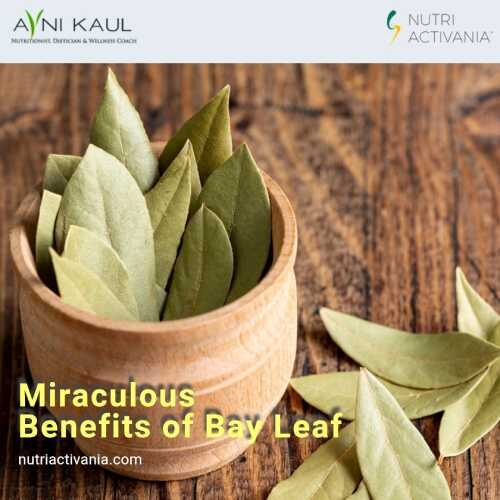Indian recipes would perhaps remain incomplete without bay leaf or Tez Patta as it is commonly called in Hindi. This humble spice takes center stage in Indian cuisine, thanks to its distinctive flavor and aromatic properties.
Its earthy, slightly floral aroma and subtle flavor can transform a dish, lending it a rich, aromatic character that is quintessentially Indian. Whether it is a hearty curry, a fragrant biryani, or a comforting lentil soup, addition of bay leaves add depth and complexity to the dish. It is fascinating how such a simple ingredient can elevate the entire flavor profile of a meal.
Who could have imagined that this small leaf could also be a treasure trove of health benefits?
Eminent Dietician, in Delhi, Avni Kaul, shares a few amazing health benefits of bay leaf in this article.
How the bay leaf is helpful for health?
Avni Kaul says that like many Indian herbs, bay leaf or Tez Patta could help you in several ways, some of which are:
Helps in Digestion
Bay leaf is rich in enzymes which facilitates the breakdown of food, easing the digestive process and alleviating discomfort such as bloating and indigestion. It helps in proper functioning of the system while decreasing the toxic levels of the body. A cup of bay leaf tea after a heavy meal not only provides comfort to your stomach but also aids digestion. You can add boil 5 grams of bay leaves with a piece of ginger in 200 ml of water until only 1/4 of the water remains. Then, add a spoonful of honey and drink this concoction twice daily and see the difference.
Good for Diabetes
Bay leaf is believed to aid in diabetes management by enhancing insulin sensitivity, potentially regulating blood sugar levels. Regular consumption may lead to decreased blood glucose, cholesterol, and triglycerides, improving insulin function in type 2 diabetes. Research suggests that it lowers serum glucose, total cholesterol, LDL cholesterol, and triglycerides while increasing HDL cholesterol, but more studies are required to confirm its efficacy and identify active components.
Takes care of your Heart
The presence of Rutin and caffeic acid in bay leaves enhances heart health. Rutin strengthens heart capillary walls, while caffeic acid helps eliminate LDL cholesterol. Bay leaves are rich in antioxidants, fighting free radicals that harm heart cells. They contain compounds lowering cholesterol levels, and reducing heart disease risk. Overall, bay leaves promote heart health effectively.
Heals Wounds
Bay leaf, scientifically known as Syzygium polyanthum, possesses antimicrobial properties that accelerate wound healing. This natural remedy alleviates pain and irritation associated with wounds. The essential oils, flavonoids, and saponins present in bay leaves contribute to their healing properties. Bay leaves contain eugenol, a compound with antimicrobial effects inhibiting the growth of bacteria and fungi. Application of bay leaves to wounds establishes a clean environment, minimizing the risk of infection.
Reduces Stress and Anxiety
Bay leaves contain compounds like linalool, eugenol, and myrcene, which have anti-inflammatory and antioxidant properties. When burned, these compounds release a calming aroma that can relax the nerves in the brain and reduce tension. Linalool, also found in lavender, is known for its anxiety-reducing effects.
To use bay leaves for anxiety relief, take 3-4 clean and dry leaves, place them in a heat-safe plate, and burn them in a closed room. Allow the smoke to fill the space, then enter the room 5-7 times, taking deep breaths. The released aroma can help create a calming environment, promoting relaxation and a lighter feeling. Avoid inhaling the smoke directly; instead, let it spread naturally in the room.
Helps in Respiratory Ailments
Bay leaf contains essential oils that can be mixed with a carrier oil to create a balm. When applied to the chest, it can provide relief from respiratory issues like allergies and asthma. Making a poultice with bay leaves and applying it overnight can also help. Inhaling the vapors of bay leaves can loosen phlegm and fight off harmful bacteria in the lungs. For respiratory problems like asthma or bronchitis, a mixture of powdered bay leaf, peepal leaf, and ginger jam can be given to the patient twice a day. Bay leaf’s expectorant properties make it effective against coughs, colds, and bronchitis. Inhaling steam infused with bay leaf can clear congestion and soothe irritated airways, making breathing easier.
Now that you are aware of the myriad health benefits of bay leaf, incorporating it into your daily routine can enhance digestion, manage diabetes, support heart health, aid wound healing, reduce stress, and alleviate respiratory ailments.





